The child abuse survivor fighting to save others
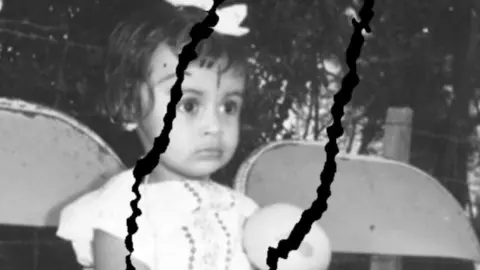 Purnima Govindarajulu
Purnima Govindarajulu In India, child sexual assault must be reported within three years or a case cannot be brought against an abuser. But for adult survivors who struggle to come to terms with their ordeal this means their abuser, frequently someone close to the family, will never be brought to justice. The BBC's Geeta Pandey met one survivor campaigning for a change in the law.
A 53-year-old Canadian woman of Indian origin recently met with India's Minister for Women and Child Development Maneka Gandhi. Her mission was to lobby for a change in the law so that adult survivors can report childhood sexual abuse.
Purnima Govindarajulu, who grew up in the southern Indian city of Chennai (formerly Madras) before moving to Canada in 1986, says she was abused by her cousin's husband regularly between the ages of six and 13.
After meeting Ms Govindarajuluin in Delhi, Mrs Gandhi said her ministry was "considering measures that will help child abuse survivors report their abusers, many years after the crimes had been committed". The law at present says a case must be brought within three years of abuse.
"I would wake up at night to find him sitting next to me in the dark. He would put his hands and mouth on my private parts," Ms Govindarajulu, who works as a conservation biologist for the Canadian province of British Columbia, said.
Although the "more intrusive penetrative acts took place at night or while travelling during the holidays", the abuse continued during the day too.
"Whenever he would find me alone, he would stick his fingers into my panties. There would be fondling, groping."
Growing up in conservative Chennai, she says she had no clue that what was happening to her was wrong and was not her fault.
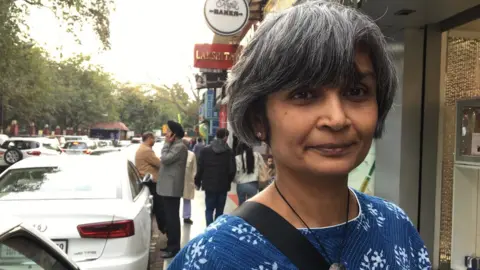
"I never thought of protesting because I believed I was evil, I was dirty, I was bad. I had no idea about sex. I had three older brothers and when at the age of 13, I began menstruating I thought I had cancer.
"I thought I was about to die but that came as a relief to me because I was so miserable in my life."
But then an aunt showed up and saw her "blood-soaked panties and assured me that I was not going to die".
"She said you are a woman now. She told me it was normal. She said this means you can have a baby. She also told me don't let anyone touch you."
It was advice that had come too late for Ms Govindarajulu, but it was still good advice.
"For the first time it made me feel I had some sort of power. So the next time he tried to touch me, I told him to stop."
And he did. "He said, 'Okay if you don't want it, I'll stop.' I realised I could have done it earlier. And that made me feel terrible that why didn't I do it?"
So all through her teen years, she says, she struggled with self-hate, and was "depressed and suicidal".
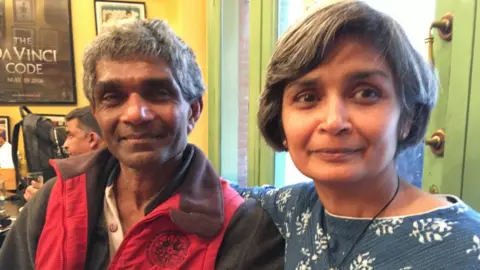
Incest and child sexual abuse are huge problems in India. According to a 2007 government study, 53% of children surveyed said they had been subjected to some form of sexual abuse. The study also revealed that a substantial number of abusers were "persons in trust and care-givers" which included parents, relatives and school teachers.
But there's a general reluctance to talk about the topic and abuse by family members is rarely reported.
It's not surprising then that Ms Govindarajulu had no idea that what had happened to her was not unique.


It was only in the late 1980s when she had moved to Canada and saw a television programme on child sexual abuse that the penny dropped.
"I was sitting on the couch in my brother's home with his wife, we were flicking channels and we came across this show. I realised I wasn't alone. I wasn't evil or bad or dirty."
Marrying a cousin is not uncommon in some Hindu communities in southern India and her sister-in-law is none other than her childhood friend, her abuser's daughter.
"She said, 'This would never happen in India.' I contradicted her, 'It does, it happened to me'. She asked me, 'It was my father, wasn't it?'," Ms Govindarajulu says.
It made sense to other family members too because, as they all said, "he doted on you while you hated him".
It still took her - and her family - years to do something about it.
In 1999, when her brother visited Chennai, he confronted the abuser about it.
"Initially he denied it. Then he said, 'Yes I touched her, but always with love.' My brother asked him if he'd also touched his daughter that way. 'Of course not,' he said.
"My brother asked him if he'd touched others too? 'None of your business,' he told him. "And then he added, 'At least I never used my penis.' Maybe he was trying to tell him that he had done nothing illegal," Ms Govindarajulu says.
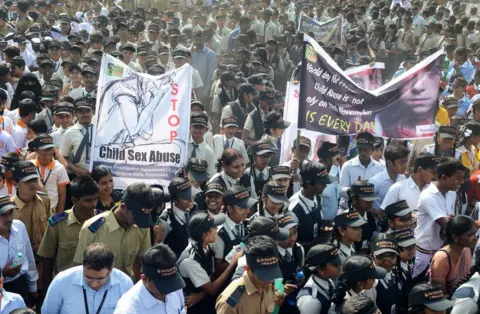 Getty Images
Getty Images"When my brother spoke to my abuser's wife, my cousin, she said, 'That makes sense. I'd see him around her bed at night but he always said that he was comforting her because she'd had nightmares."
Ms Govindarajulu says her cousin called her to say it was best to let bygones be bygones.
"She said, 'I've forgiven him, you forgive him too. He's god to me. I'm married to him.' I have not spoken to her since. It's been a huge loss for me. She was a big sister to me."
On his return from India, her brother sent out an email to the wider family. And a cousin, who didn't want to go public, confided in him that she too had been abused by the same man.
Her brothers and the rest of the family rallied around Ms Govindarajulu, offering her support, and everyone vowed that they would make sure the man had no access to children again.
But in 2013, when Ms Govindarajulu visited his house to meet her aunt who was bedridden and couldn't leave home, she felt that little had changed.
So in 2015, she took the tough decision to go public. "I went to the police in Canada, I told them I wanted to file a case but they said they had no jurisdiction" since the abuse had happened in India and that all the people were based there.
"But they were extremely supportive, they counselled me and wrote out a report for the Chennai police."
Ms Govindarajulu says the Chennai police were also "very sympathetic", but they said they couldn't register a complaint because the statute of limitations had run out.
Her petition has received more than 120,000 signatures and her cause has also won support from the women and child development minister.
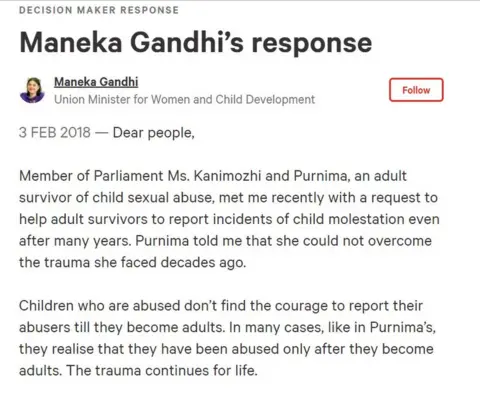 change.org
change.orgIn recent days, some of the Indian press has reached out to the man, but he has refused to respond to Ms Govindarajulu's allegations. "I have already spoken to the police about this last year. There is nothing more that I would like to say," he told one website.
Ms Govindarajulu, however, says she's not seeking just personal justice. Moreover, she says she has little hope that she will ever see her abuser prosecuted.
"He's 75 and even if a court case is brought against him, it will take a long time and he may not even live that long. But such people are almost always repeat offenders and I feel guilty about not being able to protect other children. At least we can stop him from abusing other children in future."
The abuse, she says, has affected her entire life. "I struggled with relationships, I couldn't have children."
But she draws some satisfaction from the fact that after she went public, his social status has suffered and her other cousins no longer socialise with him.
But her decision to go public has not found favour with her eldest brother who says it could embarrass the abuser's son and daughter.
"But I say there's only one criminal in this story and that's not me," says Ms Govindarajulu.
